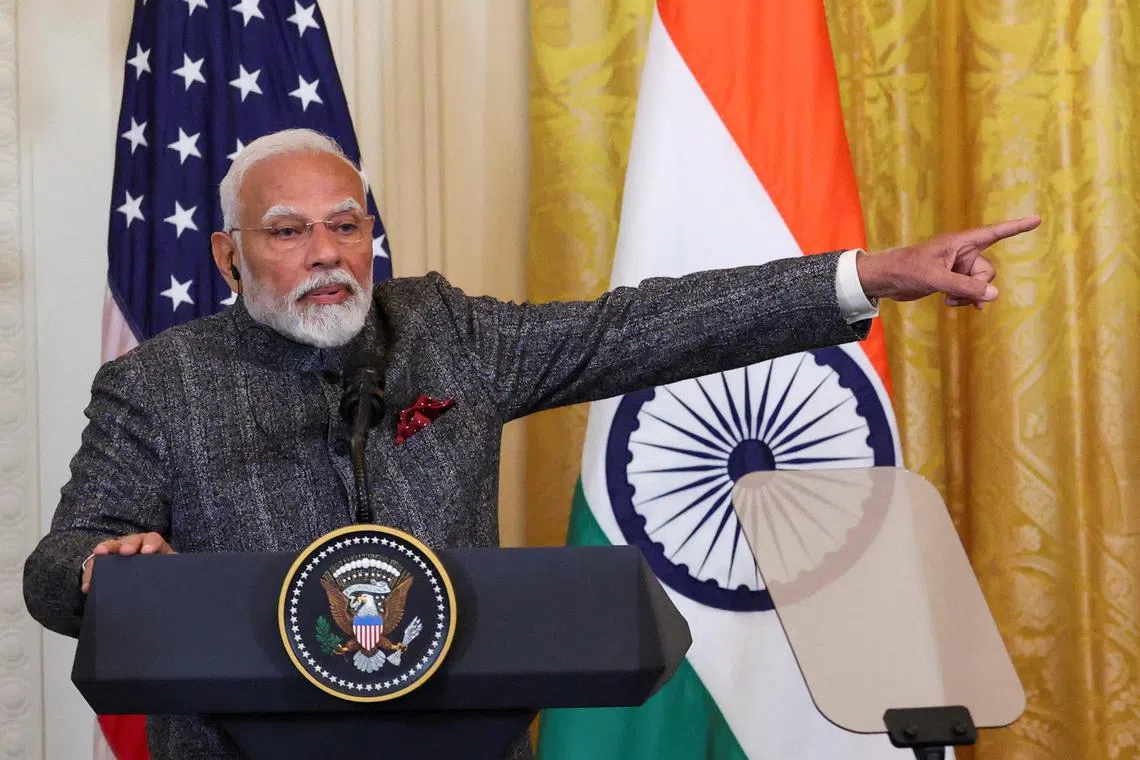Modi’s tax overhaul to strain finances but boost image amid US trade tensions
Sign up now: Get ST's newsletters delivered to your inbox

The latest initiative by Indian Prime Minister Narendra Modi marks the largest tax overhaul since 2017.
PHOTO: REUTERS
Follow topic:
NEW DELHI - Indian Prime Minister Narendra Modi’s deepest tax cuts in eight years will strain government revenues but are winning praise from businesses and political pundits who say they will bolster his image in an ongoing trade fight with Washington.
In the biggest tax overhaul since 2017, Mr Modi’s government on Aug 16 announced sweeping changes to the complex goods and services tax (GST) regime which will make daily essentials and electronics cheaper from October, helping consumers and also companies like Nestle, Samsung and LG Electronics.
At the same time, in his Independence Day speech on Aug 15, Mr Modi urged Indians to use more goods made domestically, echoing calls from many of his supporters to boycott US products after US President Donald Trump hiked tariffs on imports from India to 50 per cent
The tax cut plan comes with costs given GST is a major revenue generator. IDFC First Bank says the cuts will boost India’s gross domestic product by 0.6 percentage points over 12 months but will cost the state and federal government US$20 billion (S$25.6 billion) annually.
But it will improve weak stock market sentiment and bring political dividends for Mr Modi ahead of a critical state election in the eastern state of Bihar, said Mr Rasheed Kidwai, a fellow at New Delhi-based Observer Research Foundation.
“GST reduction will impact everyone, unlike cuts to income tax, which is paid by only 3 to 4 per cent of the population. Modi is doing this as he is under a lot of pressure due to US policies,” said Mr Kidwai.
“The move will also help the stock market, which is now politically important as it has a lot of retail investors.”
India launched the major tax system in 2017 that subsumed local state taxes into the new, nationwide GST to unify its economy for the first time.
But the biggest tax reform since India’s independence faced criticism for its complex design that taxes products and services under four slabs – 5 per cent, 12 per cent, 18 per cent and 28 per cent.
In 2024, India said caramel popcorn would be taxed at 18 per cent but the salted category at 5 per cent, triggering criticism about a glaring example of GST’s complexities.
Under the new system, India will abolish the 28 per cent slab, which includes cars and electronics, and move nearly all of the items under the 12 per cent category to the lower 5 per cent slab, benefiting many more consumer items and packaged foods.
Government data shows the 28 per cent and 12 per cent tax slabs together garner 16 per cent of India’s annual GST revenue of roughly US$250 billion last fiscal year.
‘A brighter gift’ and politics
Bihar is a key state politically and goes to the polls by November.
A recent survey by the VoteVibe agency showed Mr Modi’s opposition has an edge largely because of a lack of jobs.
“Any tax cut has wide public appreciation. But of course, the timing is purely determined by political exigencies,” said Mr Dilip Cherian, a communications consultant and co-founder of Indian public relations firm Perfect Relations.
“It seems to be an indication of some mixture of frustration as well as recognition that there is a broad public pushback against high and crippling rates of taxation.”
Mr Modi’s ruling Bharatiya Janata Party has seized on his tax announcement, posting on X that on the Hindu festival of lights, Diwali, “a brighter gift of simpler taxes and more savings is waiting for every Indian”.
Mr Modi has vowed to protect farmers, fishermen and cattlemen
The latest round of trade talks between the two nations set for Aug 25 to 29 has also been called off.

